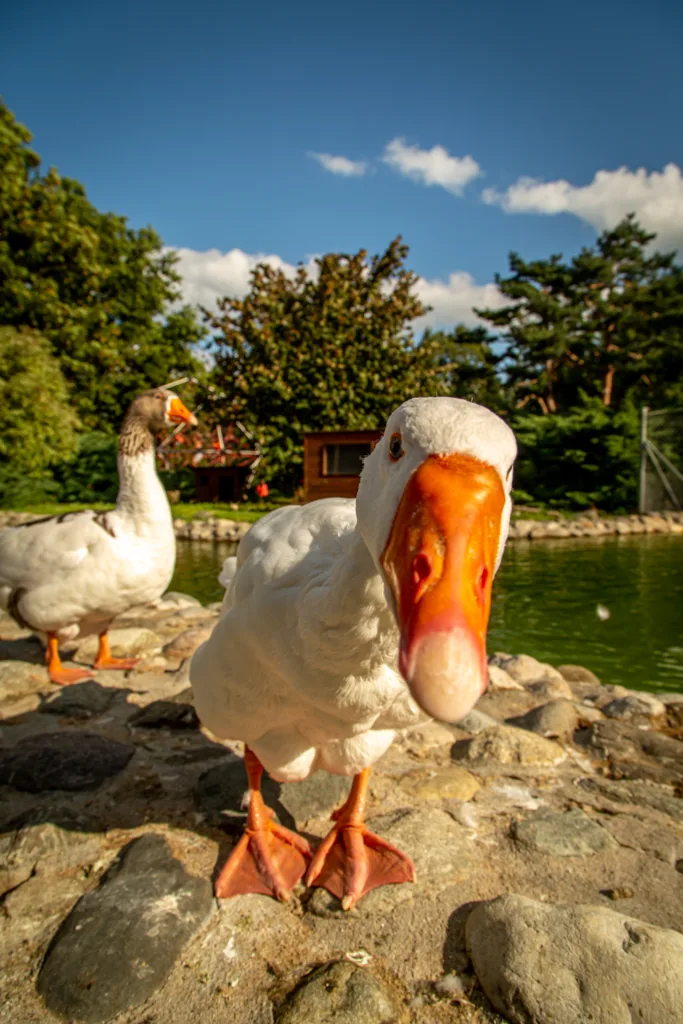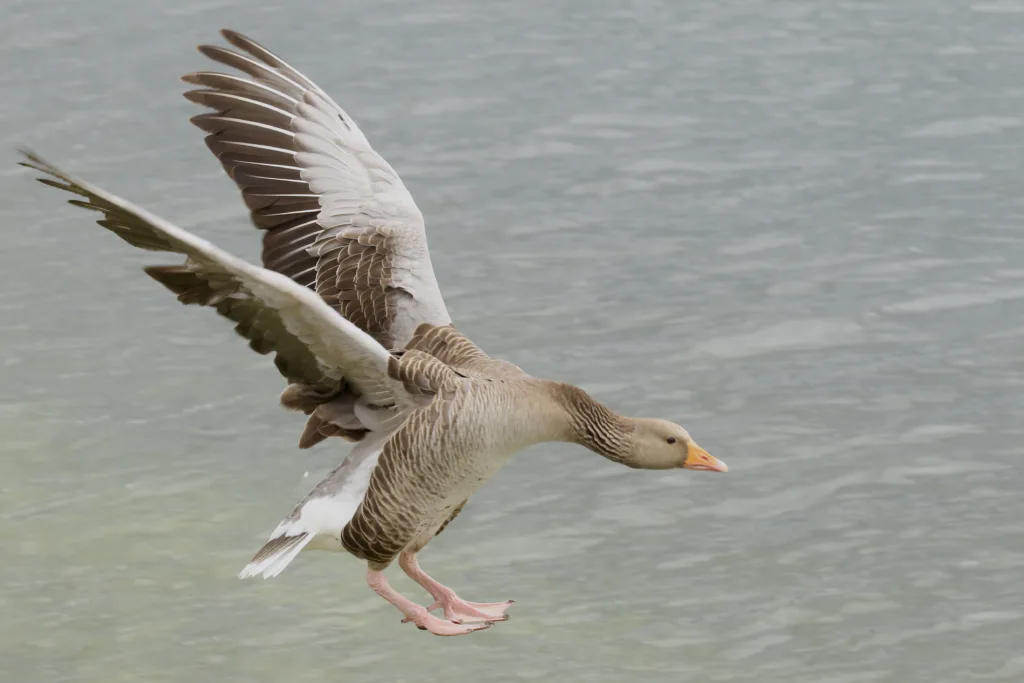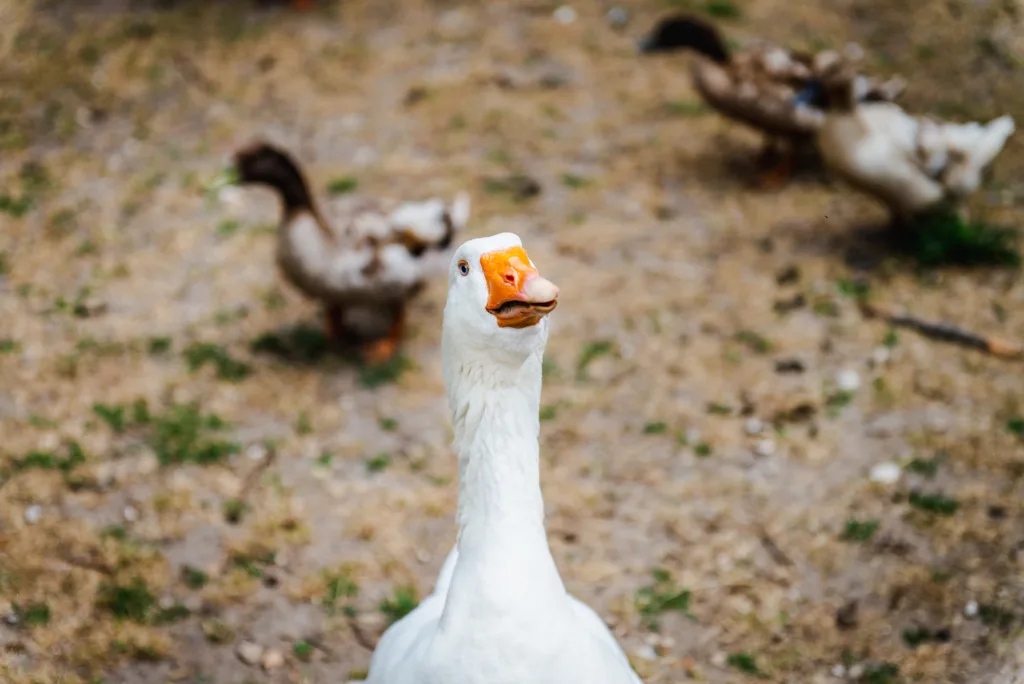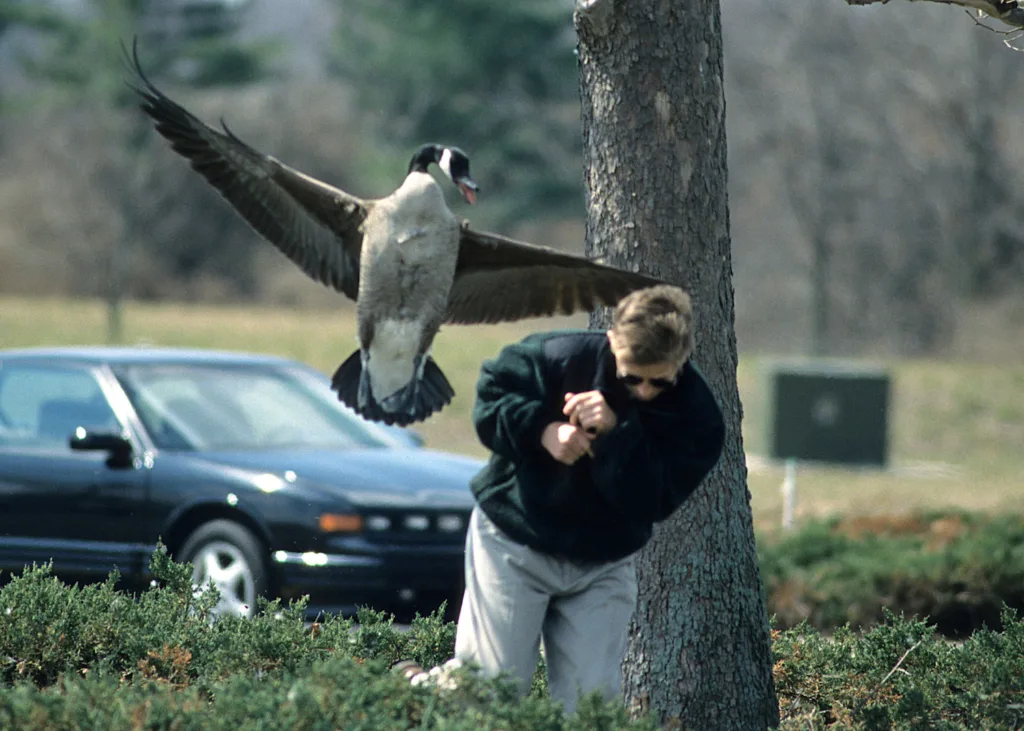Goose bites can be a serious matter, especially when it comes to the larger Canadian geese. These birds are known for their aggressive behavior, especially during nesting season. While most goose attacks on humans result in minor or no injuries, severe injuries can happen.
The attack methods of geese include biting and whacking someone with their wings. While the bite doesn’t hurt much and feels like a pinch, it can still cause injury. A goose’s wings can also cause injury, especially if they hit someone in the face.
Geese are protective of their young and will attack if they feel threatened. They nest on the ground along ponds and near people, making it easy for them to feel threatened by human activity. It’s important to give geese plenty of space and avoid getting too close to their nests.
In addition to physical injuries, goose bites can also transfer bacteria to humans. The bacteria that cause the most concern are chlamydiosis, e-coli, listeria, pasteurella multocida, and salmonella. Infected birds can shed the bacteria through feces, nasal discharge, and bites.
Humans can manifest infection through pneumonia or through a wound. It’s important to seek medical attention if you are bitten by a goose and develop symptoms such as fever, coughing, or difficulty breathing.
To avoid being bitten by a goose, it’s important to keep a safe distance and avoid disturbing their nests. If a goose begins to act aggressively, it’s best to back away slowly and give it plenty of space. It’s also important to avoid feeding geese, as this can make them more aggressive and dependent on humans for food.
While goose bites may seem minor, they can lead to serious injury and bacterial infections. It’s important to respect geese and their space to avoid any potential harm.
Consequences of Being Bitten by a Goose
Geese are known for ther aggressive and territorial behavior, and if they feel threatened or provoked, they may attack humans. If a goose bites you, the severity of the injury can vary depending on the size of the goose and the location of the bite. In most cases, goose bites result in minor injuries such as bruises, scratches, or puncture wounds.
However, severe injuries can also occur if the goose bites you with enough force. A goose’s beak is strong enough to break bones, cause head trauma, or even lead to permanent scarring. It’s essential to seek medical attention if you experience severe pain or bleeding after a goose attack.
In addition to physical injuries, goose attacks can also cause emotional distress, especially for children or individuals with a fear of birds. It’s crucial to take the necessary precautions to avoid goose attacks, such as staying away from their nesting areas, avoiding eye contact, and not feeding them.
If you find yourself in a situation where a goose is attacking you, it’s important to remain calm and avoid making sudden movements. Slowly back away from the goose while keeping an eye on its movements. If the goose continues to attack, seek help from a nearby authority or animal control agency.
To summarize, goose bites can result in minor to severe injuries, and it’s crucial to seek medical attention if necessary. Taking precautions to avoid goose attacks and knowing how to handle them can help prevent injuries and emotional distress.

The Pain of a Goose Bite
Canada geese are known to be territorial birds, and when they feel threatened or their young ones are in danger, they can become aggressive towards humans. Their attack methods may include biting or whacking someone with their wings. While the bite of a Canada goose may not be extremely painful, it can still hurt and feel like a pinch. The level of pain may vary depending on the individual’s pain tolerance and the severity of the bite.
It is important to note that getting too close to a Canada goose or its nest can provoke an attack, and it is best to keep a safe distance and avoid interaction with these birds. In case of a goose bite, it is recommended to clean the wound thorougly and seek medical attention if necessary. It is also advisable to report the incident to the authorities to prevent further attacks and ensure the safety of the public.
The Risks of Being Bitten by a Goose
You can get sick from a goose bite. Canada geese can carry several types of bacteria that can cause infections in humans. The bacteria of concern are chlamydiosis, e-coli, listeria, pasteurella multocida, and salmonella. When someone is bitten by an infected goose, they may contract one of these bacteria, which can lead to illness.
Infected birds can shed the bacteria trough feces, nasal discharge, and when biting someone. Therefore, it is important to take precautions when around geese, especially if they appear sick or aggressive.
Symptoms of infection may include fever, chills, muscle aches, cough, and difficulty breathing. In some cases, the infection can lead to pneumonia or sepsis, which can be life-threatening.
If you are bitten by a goose, it is important to clean the wound thoroughly with soap and water and seek medical attention if necessary. Additionally, it is recommended to avoid feeding or interacting with geese in areas where they are commonly found, such as parks and lakes.
While rare, it is possible to get sick from a goose bite due to the bacteria they can carry. Taking precautions and seeking medical attention if necessary can help prevent and treat potential infections.
The Dangers of Geese Biting: Understanding Why Geese Bite People
Geese can be aggressive and territorial animals, and biting is a common behavior they exhibit towards their owners or caretakers. There are several reasons why geese may bite, including fear, defense, and dominance.
Fear is a common trigger for geese to bite. If they feel threatened or intimidated, they may try to defend themselves by biting. This can happen if the goose is approached too quickly or unexpectedly, or if their personal space is invaded.
Geese may also bite to defend their territory. They are highly territorial animals and will protect their nesting sites, food sources, and othr resources. If they perceive a threat to their territory, they may become aggressive and bite.
Dominance is another reason why geese may bite. Geese have a hierarchical social structure, and they will establish a pecking order within their group. If they feel that their dominance is being challenged, they may resort to biting as a way to establish their authority.
To avoid being bitten by geese, it is important to give them adequate space and respect their boundaries. You should approach them slowly and calmly and avoid making sudden movements. If you need to enter their space, make sure to do so gradually and avoid startling them. Additionally, you should establish yourself as the dominant figure by using firm but gentle handling techniques.
Geese may bite due to fear, defense, or dominance. By understanding their behavior and respecting their boundaries, you can minimize the risk of being bitten by a goose.
Can a Goose Transmit Rabies?
A goose cannot give you rabies. Geese are not known to be carriers of the rabies virus, and there have been no reported cases of humans contracting rabies from geese. In fact, avian species, including geese, are generally considered to be at low risk for transmitting rabies to humans. Rabies is primarily transmitted through the saliva of infected mammals, such as dogs, cats, and bats. It is important to note that while geese are not a rabies risk, they can stll carry other diseases that humans can contract, such as salmonella. It is recommended to practice good hygiene when handling geese or any other animals to reduce the risk of contracting any potential diseases.

The Aggressiveness of Geese
Geese are known for their aggressive behavior, esecially during breeding season. They can become territorial and protective of their nests, eggs, and goslings, and will attack anyone who they perceive as a threat. Geese can be particularly aggressive towards humans, especially if they feel that their space is being invaded.
Geese are known to hiss, flap their wings, and charge at people when they feel threatened. They may also bite or peck at people, and can cause serious injury if they attack in large groups. It’s important to remember that geese are wild animals, and should be treated with caution and respect.
It’s worth noting that not all geese are aggressive, and some may be more docile than others. However, it’s always better to err on the side of caution, and give geese plenty of space. If you do encounter an aggressive goose, it’s best to back away slowly and avoid making direct eye contact, as this can be seen as a threat.
Geese can be very aggressive, especially during breeding season. They may attack humans who they perceive as a threat, and can cause serious injury if they attack in large groups. It’s important to treat geese with caution and respect, and give them plenty of space to avoid any potential conflicts.
Can a Goose Cause a Broken Arm in a Man?
It is possile for a goose to break a man’s arm. Geese are known to be territorial and protective of their nests. When they feel threatened, they may become aggressive and attack.
In the case mentioned in the news article, the two men walked past the goose’s nest, which was located in a flower bed beside an office entrance. The goose felt threatened by their presence and attacked them. One of the men broke his arm, while the other dropped his cell phone while recording the incident.
Geese have strong wings and beaks, which can cause significant injuries to humans. They can also be quite fast and agile, making it difficult to avoid their attacks.
It is important to note that geese generally do not attack unprovoked. They only become aggressive when they feel that their nest or young are in danger. Therefore, it is important to respect their space and avoid getting too close to their nests.
To avoid getting injured by a goose, it is recommended to keep a safe distance and avoid making eye contact with them. If you must pass by a goose’s nest, do so quickly and quietly. If a goose does attack, try to protect your face and head, and seek medical attention if necessary.
While it is not common for a goose to break a man’s arm, it is possible for them to cause significant injuries when they feel threatened. It is important to respect their space and avoid provoking them to prevent any potential harm.
Do Geese Have Sharp Teeth?
Geese teeth, also known as tomia, are specialized structures made of cartilage that are located along the edges of teir bills. Despite being made of cartilage, these teeth are very hard and sharp, designed to rip through tough vegetation and even small animals.
The sharpness of geese teeth can vary depending on the species of goose, but in general, they are quite sharp. The teeth are used to grasp and tear food, and they can easily slice through tough plant material like grass and reeds.
The sharpness of geese teeth is due to the shape and structure of the tomia. They are thin and pointed, with a slightly curved shape that allows them to grip and tear at food. The teeth are also serrated, which means they have small ridges or notches along the edges that help to cut through tough material.
Geese teeth are very sharp and effective tools for feeding. They are designed to rip and tear through tough vegetation and small prey, and their shape and structure make them highly effective at this task.
Grabbing a Goose by the Neck: Is It Recommended?
You are not supposed to grab a goose by the neck. This is an unsafe and harmful practice that can result in serious injury or even death to the goose. The neck is a delicate and sensitive area, and grabbing it can cause significant pain and discomfort to the bird. Moreover, geese have strong necks and can easily struggle free, potentially causing further harm to themselves or those handling them.
Instead, if you need to handle a goose, it is recommended that you do so gently and carefully, using both hands to support their body. It is also important to approach geese slowly and calmly, as sudden movements or loud noises can startle and agitate them. If possible, it’s best to avoid handling geese altogether and allw them to go about their business undisturbed. If you encounter a goose in distress or in need of assistance, it’s best to contact a wildlife rehabilitation center or other qualified professional for help.

The Risk of Disease Transmission from Geese
Geese can indeed carry diseases that can be transmitted to humans. These diseases include bacterial infections such as salmonella, E. coli, and listeria, which can be present in the goose’s feces. This means that if you come into contact with goose feces, you could potentially contract one of these bacterial infections.
Furthermore, geese can carry the bird flu virus, which can also be transmitted to humans. The bird flu virus can cause serious illness in humans, and in some cases, it can be fatal. Therefore, it’s important to take precautions when handling geese or coming into contact with their feces.
To minimize the risk of contracting a disease from geese, it’s recommended that you avoid contact with their feces and wash your hands thoroughy after handling geese or their eggs. Additionally, it’s best to cook goose meat thoroughly to kill any potential bacteria or viruses that may be present.
While geese are beautiful and interesting birds, it’s important to be aware of the potential health risks associated with them. By taking proper precautions, you can enjoy these birds without putting your health in jeopardy.
Do Geese Possess Poison?
Geese are not generally considered to be poisonous animals. However, there is a population of spur-winged geese, specifically those found in the Gambia, that are known to be poisonous. These geese consume a particular type of beetle called the blister beetle which contains a toxic chemical called cantharidin. While the geese themselves are immune to the toxin, their flesh can be dangerous to consume as it contains the same chemical.
It is important to note that not all populations of spur-winged geese are poisonous; only those that consume the blister beetle. Other species of geese are not known to have toxic properties.
While geese are generally considered safe to eat, it is important to be aware of the specific diet of the bird in question, particularly if it is a spur-winged goose from the Gambia. It is always recommended to exercise caution and consult with a qualified expert before consuming any animal that may have potential health risks associated with it.
How to Respond to an Attack from a Goose
Geese are often seen as peaceful creatures, but they can become aggressive if they feel threatened or if they perceive a potential danger to their young ones. If you are ever attacked by a goose, it is important to know what to do to protect yourself.
Firstly, it is essential to maintain direct eye contact with the goose and keep your chest and face pointed towards it, as turning your back or shoulders away can make the goose feel more aggressive. It is also important to stay calm and avoid showing any signs of hostility or fear.
Next, you should slowly and calmly back away from the goose, being mindful of any obstacles in your path. Do not run away, as this can trigger the goose’s natural instinct to chase afer you. It may also help to use a firm and assertive voice to command the goose to back off.
If the goose continues to attack you, it may be necessary to use physical force to protect yourself. This can include using an object to create a barrier between you and the goose or using a jacket or shirt to cover your arms and hands while you gently push the goose away.
If you are ever attacked by a goose, it is important to remain calm, maintain direct eye contact, and slowly back away while avoiding any sudden movements. If necessary, use physical force to protect yourself, but always try to avoid harming the goose if possible.
Defending Against a Goose
Geese can be aggressive and territorial birds, especially durng their breeding season. If you find yourself in a situation where a goose is attacking you, it’s important to know how to defend yourself.
First and foremost, do not yell or hit the goose. This will only provoke it further and may result in more aggressive behavior. At the same time, do not cower, hide, or run. This can also trigger the goose’s territorial instincts and make it more aggressive.
Instead, try to remain calm and face the attacking goose. Keep your arms close to your body and avoid making sudden movements. If the goose flies up towards your face, then duck or move away at a 90-degree angle to the direction of flight, still facing the attacking goose. This will allow you to avoid the bird’s wings and keep it in your line of sight.
If possible, try to put an object between you and the goose, such as a bag or a jacket. This can help to distract the bird and give you time to move away safely. You can also try to use a loud noise, such as clapping your hands or shouting, to startle the goose and make it back off.
The best way to defend yourself against a goose is to remain calm, avoid provoking the bird, and use careful, deliberate movements to keep it at bay. With these tips in mind, you can stay safe and avoid confrontation with these territorial birds.

Are Geese Aggressive Towards Their Owners?
Geese can be aggressive towards teir owners, but this behavior is not common. Domesticated geese are usually friendly towards their owners and can even form strong bonds with them. However, it is important to note that geese are protective animals and will defend their territory if they feel threatened.
During breeding season, geese may become more aggressive as they protect their nests and young. It is important to be cautious around geese during this time and to give them their space.
Geese are not typically aggressive towards their owners but can exhibit protective behavior when necessary. It is important to understand their behavior and respect their space to avoid any potential conflicts.
Do Geese Recognize Humans?
Geese are widely known for their intelligence and remarkable memory. They have an excellent ability to recognize and remember people, animals, and situations for a long time. Therefore, it is safe to say that geese can remember humans.
Research has shown that geese possess a cognitive ability that allows them to remember people who have interacted with them in the past. They can even distinguish between different people and remember their unique characteristics such as voice, scent, and appearance. This makes geese an ideal watch animal that can spot unfamiliar humans from a distance and alert their owner of the potential threat.
Furthermore, geese are known to form strong bonds with their human caretakers, which further enhances their ability to remember them. This bond is formed through regular interaction and positive reinforcement, such as prviding them with food, water, and shelter.
In addition to humans, geese can also remember other animals and situations. They can recognize predators and remember their scent, sound, and behavior, which helps them to avoid danger and protect their offspring.
Geese have a remarkable memory, and they can remember humans, animals, and situations for an extended period. This cognitive ability is a vital survival tool that helps them to stay safe and protect their young ones.
Conclusion
While most goose attacks on humans result in minor or no injuries, it is important to note that severe injuries can happen. Geese may resort to aggressive behavior to protect their young or ward off danger, and their attack methods can include biting or whacking someone with their wings. It is also important to be aware of the potential transfer of bacteria from Canada geese to humans, including chlamydiosis, e-coli, listeria, pasteurella multocida, and salmonella. Infected birds can shed the bacteria throgh feces, nasal discharge, and when someone is bitten. It is important to exercise caution when around geese, especially during nesting season, and to seek medical attention if bitten or exposed to potentially harmful bacteria. By being informed and taking necessary precautions, we can minimize the risks associated with interactions with geese.
